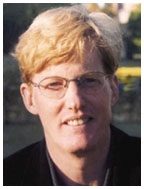
|
|
September 14, 2005: A moment with...
(Photo by Jeroen Kramer)
|
Joshua Landis *97
Historian of Syria Joshua M. Landis *97 spent his early childhood in Saudi Arabia and Lebanon, moving back to the United States at the age of 11. After graduating from Swarthmore College, he returned to the Middle East, teaching English in Beirut before moving to Damascus in 1981 as one of the first American Fulbright fellows to arrive in Syria. He earned his Ph.D. in Near Eastern Studies at Princeton and is now on leave from the University of Oklahoma, living in Damascus with his family on a Fulbright research fellowship. He writes a popular blog, www.syriacomment.com, and his book, Democracy in Syria, will be published in 2006. Landis spoke recently to Katherine Zoepf ’00, the Middle East correspondent for the Chronicle of Higher Education.
When you arrived in Damascus in the early 1980s, Syria was one of the most closed countries in the world. What was it like being one of the first American students there?
It was a fantastic, eventful year that changed my life. The Fulbright program had just opened in Syria, and I arrived in Damascus just in time for the Hama massacre and the Israeli invasion of Lebanon. I went to Hama right after the massacre. It was a scene of total devastation. The authorities were letting everyone just walk around and see it, because they wanted everyone to know what happened when you tried to overthrow the Syrian government.
Now, you are married to a Syrian. Has this changed the way people react to you?
It has completely changed my life in Damascus. You become part of a big family. When my son got a little illness, my mother-in-law, who is not a religious person, promised God that if he got better she would sacrifice a sheep. Sure enough, my son got better, and so we went up to the village and sacrificed a sheep and distributed two-thirds of it to the poor. We ate a lot of lamb!
President Bashar al-Assad’s reforms have created an atmosphere of more openness here. Are Syrians more willing to engage with you?
Absolutely. In the 1980s, there was nobody to talk to. Young kids had no idea how the world worked, and older people were too frightened to be honest. Intellectual life was a total bore. Today, you can have really interesting discussions about politics with people from every walk of life.
Your upcoming book is called Democracy in Syria. Many people in Washington are trying to figure out whether that’s possible.
At Princeton, I started studying the period in which democracy flourished in Syria. It was punctuated by coups, but from 1946 to 1963 the military didn’t really take over completely. Parliaments changed, presidents changed, parties changed.
Why did it fail?
I propose a short answer, which is that not one of the political parties that formed during this early period accepted the borders of Syria as they had been laid down after the first World War. In a sense Syria has been in a hundred-years war with the West since the Sykes-Picot treaty of 1916, when the imperial powers divided up the Middle East. The Arabs reacted against this by producing Arab nationalism, and Syria today is the last of the Arab nationalist states that’s still struggling with the U.S. on all these basic issues. The U.S. keeps waiting for Syria to embrace its present borders, to get rid of Arab nationalism. A country that can sustain democracy has to solve these most basic international identities.
Has the war in Iraq had an impact on these identity questions?
The first question that is asked by every Syrian in government is: Would the Syrian people defend their government in a way that Iraqis did not defend Saddam Hussein? Everyone comes to the conclusion that they would not. So the question becomes, how do we develop legitimacy and a sense of nationalism? The obvious answer is democracy. But Syria is a society that is almost as divided as Iraq. It’s sitting between Lebanon, which went through a terrible civil war, and Iraq, which is being torn apart by sectarian divisions. So the Syrians’ general sense is that the devil we know is better than the devil we don’t.
So the Iraq war has built legitimacy for the Syrian president?
Yes. He stands for stability. Syria is one of the safest countries in
the world. Everything basically works. Life is hard, but nobody wants
to jeopardize that. I talk to almost every shopkeeper and taxi driver,
and they say, “I don’t care about politics. I would vote Bashar
king of Syria for life if he’d just put food on the table.”
Although the elites are all talking democracy, 80 percent of the people
see democracy as a dangerous obstacle course. The poor people believe
that they’ll be the ones to suffer from democracy. ![]()

